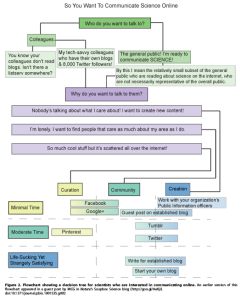‘An Introduction to Social Media for Scientists‘. I have wanted to mention this article published in PLOS Biology ever since it came out in April 2013, but somehow never got around to it. But as I reread it earlier this week, I was reminded how this article must be mentioned on a blog like mine.
An Introduction to Social Media for Scientists is written by Holly M. Bik and Miriam C. Goldstein from University of California Davis and University of California San Diego and is an excellent place to start for researchers considering trying out social media or for enthusiasts of social media for science communication who are in search of good arguments they can use to persuade others of why they must set up a Twitter account, start blogging or establish some other form of online presence.
Research Benefits and flowcharts
Supported by lots of examples (with links provided to many of them!) the authors list a number of ways in which social media can benefit both the scientist and the scientific work. In short form these are:
- How online tools can help improve research efficiency;
- How being visible on social media helps track and improve scientific metrics;
- How social media enhances professional networking; and
- How online interactions have the potential to enhance ‘‘broader impacts’’ by improving communication between scientists and the general public.

They go on to address different kinds of social media and how they can be used, and provide advice to new users on how to get started. A useful (and fun) feature of the article is a flowchart that can help newcomers find out which media might be most relevant for them to try out and solution to common online communication fears.
Acknowledging the stigma
Throughout the article the authors mention the stigma which is often attached to online activities. They acknowledge how many researchers are skeptical towards the media and regards it as a waste of time and a distraction from true scientific work. In a response to this the authors have set out to address some of the many misconceptions and misinterpretations of what social media can contribute with. And in my opinion it works. One could argue that they don’t spend much energy on the risks or disadvantages of social media for science communication (of which there are of course several), but they are plenty to be found elsewhere.
Need for formal training
Social media among scientists is quickly growing and will eventually become more and more natural for scientists to use (if not sooner than as the younger generation whom have grown up with social media enter the research arena). But until then there is a need to train on researchers and scholars on the potential of social media in academic work. Both to address the many misconception and skepticism but also to avoid researchers use it inefficiently or inappropriately. I could therefore not agree more with the authors:
“Social media and internet-based resources are increasingly ubiquitous. Thus, there is a pressing need for scientific institutions to offer formalized training opportunities for graduate students and tenured faculty alike to learn how to effectively use this new technology”.


